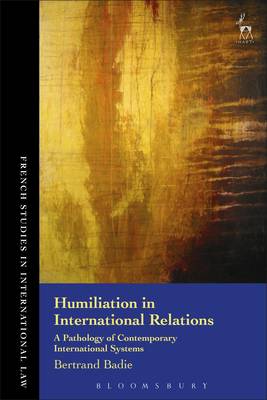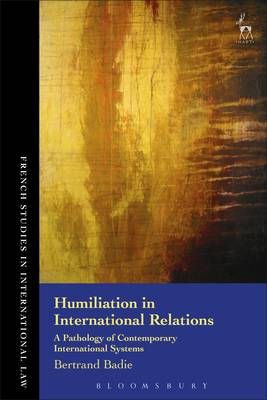
Bedankt voor het vertrouwen het afgelopen jaar! Om jou te bedanken bieden we GRATIS verzending (in België) aan op alles gedurende de hele maand januari.
- Afhalen na 1 uur in een winkel met voorraad
- In januari gratis thuislevering in België
- Ruim aanbod met 7 miljoen producten
Bedankt voor het vertrouwen het afgelopen jaar! Om jou te bedanken bieden we GRATIS verzending (in België) aan op alles gedurende de hele maand januari.
- Afhalen na 1 uur in een winkel met voorraad
- In januari gratis thuislevering in België
- Ruim aanbod met 7 miljoen producten
Zoeken
Humiliation in International Relations A Pathology of Contemporary International Systems
A Pathology of Contemporary International Systems
Bertrand Badie
€ 93,45
+ 186 punten
Omschrijving
In international relations (IR), some states often deny the legal status of others, stigmatising their practices or even their culture. Such acts of deliberate humiliation at the diplomatic level are common occurrences in modern diplomacy. In the period following the breakup of the famous 'Concert of Europe', many kinds of club-based diplomacy have been tried, all falling short of anything like inclusive multilateralism. Examples of this effort include the G7, G8, G20 and even the P5. Such 'contact groups' are put forward as if they were actual ruling institutions, endowed with the power to exclude and marginalise.
Today, the effect of such acts of humiliation is to reveal the international system's limits and its lack of diplomatic effectiveness. The use of humiliation as a regular diplomatic action steadily erodes the power of the international system. These actions appear to be the result of a botched mixture of a colonial past, a failed decolonisation, a mistaken vision of globalisation and a very dangerous post-bipolar reconstruction.
Although this book primarily takes a social psychology approach to IR, it also mobilizes the resources of the French sociological tradition, mainly inspired by Emile Durkheim. It is translated from Le temps des humiliés. Pathologie des relations internationales (Paris, Odile Jacob, 2014).
Today, the effect of such acts of humiliation is to reveal the international system's limits and its lack of diplomatic effectiveness. The use of humiliation as a regular diplomatic action steadily erodes the power of the international system. These actions appear to be the result of a botched mixture of a colonial past, a failed decolonisation, a mistaken vision of globalisation and a very dangerous post-bipolar reconstruction.
Although this book primarily takes a social psychology approach to IR, it also mobilizes the resources of the French sociological tradition, mainly inspired by Emile Durkheim. It is translated from Le temps des humiliés. Pathologie des relations internationales (Paris, Odile Jacob, 2014).
Specificaties
Betrokkenen
- Auteur(s):
- Uitgeverij:
Inhoud
- Aantal bladzijden:
- 184
- Taal:
- Engels
- Reeks:
Eigenschappen
- Productcode (EAN):
- 9781509934669
- Verschijningsdatum:
- 28/11/2019
- Uitvoering:
- Paperback
- Formaat:
- Trade paperback (VS)
- Afmetingen:
- 156 mm x 234 mm
- Gewicht:
- 258 g

Alleen bij Standaard Boekhandel
+ 186 punten op je klantenkaart van Standaard Boekhandel
Beoordelingen
We publiceren alleen reviews die voldoen aan de voorwaarden voor reviews. Bekijk onze voorwaarden voor reviews.









